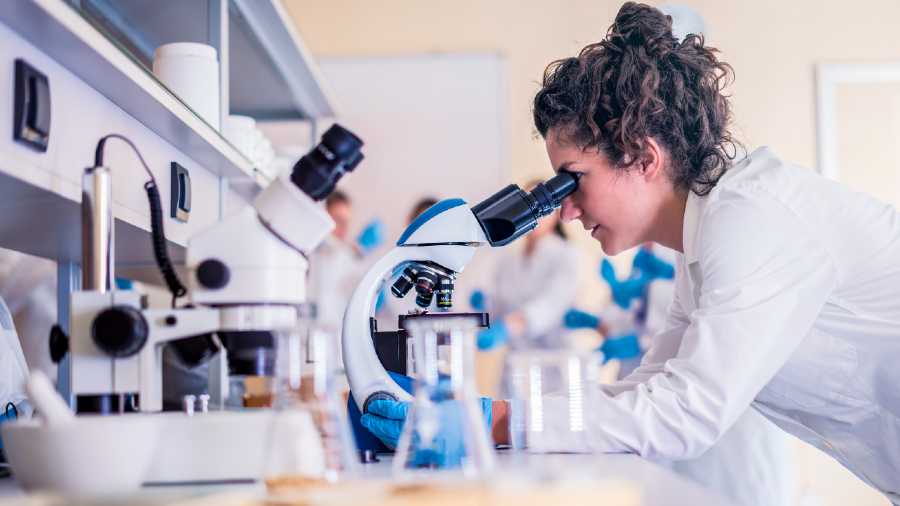The last two years have been chaotic as the Covid-19 pandemic wreaked havoc with life and work. But one of the positive outcomes that have emerged through these trying times is the power of science to shape and understand our world. The pandemic truly pushed healthcare and life science professionals to the forefront. Epidemiologists and virologists predicted the virus’s progress, biochemists developed the vaccine while doctors and medical staff diagnosed, tested and treated those who were ailing.
According to Imroze Khan, assistant professor of biology at Ashoka University, Sonipat, people have been trying to find cures for diseases for thousands of years, but there are certain phases in human history when research has been catalysed, and this is one such time. He says, “This has definitely kindled an interest among young people to look beyond the boundaries of textbook knowledge and see biology for the experiential and dynamic science that it is.”
At global institutions such as the University of Bath in the UK, there’s been a surge in applications for life science courses. In India, too, Ahmedabad University (AU) saw increased applications for their life science courses last year. Mahima Reji, a final-year student pursuing BSc (Hons) in life sciences at AU says, “People are beginning to realise the importance of research.” She plans to get into pharma management and drug development in the future.
Ayush Mistry is studying biology and political science at Ashoka University and plans to do a master’s degree in public health after this. He is also interested in oncology. “I want to tie my background in the life sciences with policy-making and work in public health,” says Ayush.
Even high-schoolers have shown initiative and interest and have approached professors and researchers to work on various projects. Khan states that students can approach individual faculty in an institution — nobody will refuse an enthusiastic student. “I had a very bright student from a Delhi school working with me the entire summer. He was trying to understand pathogen abundance in the environment. This is a real-life problem of a serious kind that a Class XI student was working on which is quite extraordinary.”
Students have been inspired by research teams and scientists who were in the news due to the pandemic. Geetha Rajkumar, a Class X student at National Public School, Bangalore, says she was always interested in science but was unsure about what she would do. “I did not want to become a doctor, but neither did I understand what it meant to be a researcher or a scientist. Now I am keen to study viruses and the immune system. I am very excited about the future.”
The number of start-ups in the life science and healthcare space have been growing steadily, from
2,600 in 2018 to around 4,200 in 2021 as per data from Birac (Biotechnology Industry Research Assistance Council). 3i Molecular Solutions, Aura Biotech, InnAcell, Molbiogen, Promeatherapetics, Nu Genomics, and XCodelife, are some of the well-known start-ups.
Rahul Ranganathan, CEO and cofounder of NuGenomics, a human genomics and machine learning start-up, says, “For the longest time, people have been looking at biology as a route leading to medicine or dentistry. But now, we are entering an era of multidisciplinary studies. So when you combine the life sciences with something like artificial intelligence or machine learning, you get remarkable results. For instance, when we do our tests and diagnostics, we look at almost five million data points for a single consumer, and no human can look at that many data points. So, it has to be done in a machine learning way.” He believes that among traditional careers public health, hospital management and administration, and supply chain management are coming to the forefront.
According to Kunal Vora, founder and CEO of SHRM Biotechnologies, Calcutta, many research-related jobs are available. He says, “Drug companies such as Dabur, Ranbaxy, Hindustan Unilever and Dr Reddy’s Labs have research and development units and offer handsome pay packages to biotechnology professionals. There are also some great opportunities available to biotechnologists in the food processing, textile as well as chemical industries.”
Vora also expects career options such as epidemiology, biochemistry, biomedical engineering, microbiology, genetics, biophysics and clinical research to gain significant momentum. He adds, “So you can pursue an MSc in biosciences, an MBA in biotechnology or an MBA in pharmaceutical management. One can also look at national-level entrance exams such as CSIR NET, GATE, DBT, JRF, NET, as clearing these exams would improve the prospects of securing research jobs.”
The pandemic has shown humanity how shorthanded we are when tackling a new disease. But, with a young and motivated generation of researchers now entering the field, our future will hopefully be much more secure.











